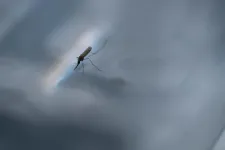(Press-News.org) More than a quarter of Australians over the age of 50 take cholesterol-lowering drugs to prevent heart disease and strokes, but our bodies also need cholesterol to survive. Now, scientists from The Australian National University (ANU) say its role as a basic building block of life holds the key to treating deadly diseases caused by parasites, including malaria.
The researchers have developed a trojan horse method that tricks malaria parasites into ingesting a fatal dose of drugs by exploiting the parasite’s need for cholesterol to survive. By attaching cholesterol to drugs, the scientists can “smuggle” the drugs into the parasite where they can exert their killing effect.
The new trojan horse method could lead to more effective and longer-lasting treatments for malaria. According to the scientists, the findings also have implications for the agricultural industry, as parasites can infect and kill livestock, leading to billion-dollar losses for farmers.
Lead researcher Professor Alex Maier from ANU said the trojan horse method of smuggling drugs into the parasites is three to 25 times more effective at eliminating the parasites compared to drugs that aren’t attached to cholesterol.
“Due to its bad reputation, people often forget that cholesterol is a basic building block of life and humans and animals need it to function and survive. Parasites are particularly desperate for cholesterol, since they have lost the ability to make their own,” Professor Maier said.
“Since parasites can’t produce cholesterol of their own, they steal it from their hosts and stockpile it.”
After a mosquito injects the malaria parasites into humans, the parasites eventually enter red blood cells where they hide from the immune system. Although malaria can be cured with drugs, malaria parasites are smart. They are continually finding new ways to adapt and build resistance to current therapies, keeping scientists on their toes.
But the ANU scientists say their new technique, which disguises the drugs under the veil of the cholesterol, addresses this long-standing issue.
“Existing drugs used to treat malaria are taken up passively by the parasite, meaning they’re not as effective as they could be,” Professor Maier said.
“By attaching the drugs to cholesterol, the parasite actively latches onto and eats the cholesterol. This allows us to smuggle drugs into optimal killing zones inside the parasite where the drugs can inflict the most damage.
“Using this approach, we can also repurpose existing drugs that have lost their bite and make them effective again. Essentially, we’re giving new life to existing drugs that have since become redundant.
“This research also paves the way for the development of new, more efficient drugs that are also cheaper to manufacture.”
According to the ANU scientists, this new drug delivery system of coupling drugs with cholesterol could also be used to treat other diseases including giardia, an intestinal disease responsible for causing diarrhoea.
It could also help treat leishmaniasis, a skin, mouth, nose and throat disease that disproportionally impacts some of the world’s poorest people. If not treated, leishmaniasis can be fatal.
Professor Maier said the research could also unlock new and more effective therapies to treat parasitic diseases in companion animals and livestock, which would prevent billions of dollars in damages and provide a major boost to the agricultural industry, including in Australia.
The research is published in EMBO Molecular Medicine. This work was a collaboration between scientists at the Research School of Biology and Research School of Chemistry at ANU and researchers from Germany.
END
Trojan horse method gives malaria parasites a taste of their own medicine
2024-08-14
ELSE PRESS RELEASES FROM THIS DATE:
Singapore scientists discover breakthrough method to activate dormant stem cells in the brain
2024-08-14
Scientists from Duke-NUS Medical School and the Mechanobiology Institute (MBI) at the National University of Singapore (NUS) have discovered a novel pathway to wake up dormant neural stem cells, offering potential new therapies for neurodevelopmental disorders such as autism, learning disabilities, and cerebral palsy.
In the mammalian adult brain, most neural stem cells, which originate from the nervous system and can grow into various types of brain cells, stay dormant until they receive specific signals that activate them. Once woken up, they produce new neurons, aiding in brain repair and growth.
Defects in neural stem cell activation ...
Rare archaeological site reveals ‘surprising’ Neanderthal behaviour at Pyrenees foothills
2024-08-14
An unchartered area in the foothills of the Southern Pyrenees in Spain is providing insights into a poorly known period of Neanderthal history, offering clues that could help archaeologists uncover the mystery of their downfall, according to new research from The Australian National University (ANU).
Abric Pizarro is one of only a few sites worldwide dating from 100,000 to 65,000 years ago during a period called MIS 4. The researchers have gathered hundreds of thousands of artefacts, including stone tools, animal bones and other evidence, providing significant data about the Neanderthal way of life during that time -- largely unknown in human history until now.
The findings ...
How our biases are reflected in how fast we make decisions
2024-08-14
Quick decisions are more likely influenced by initial biases, resulting in faulty conclusions, while decisions that take time are more likely the result in better information, according to new research led by applied mathematicians at the University of Utah.
A team that included Sean Lawley, an associate professor of mathematics, and three former or current Utah graduate students used the power of numbers to test a decision-making model long used in psychology.
They developed a framework to study the decision-making processes in groups of people holding various levels of bias.
“In large populations, what we see is that slow deciders are making more accurate ...
Brigham study finds shingles increased risk of subsequent cognitive decline
2024-08-14
A new study led by investigators from Brigham and Women’s Hospital, a founding member of the Mass General Brigham healthcare system, found that an episode of shingles is associated with about a 20 percent higher long-term risk of subjective cognitive decline. The study’s findings provide additional support for getting the shingles vaccine to decrease risk of developing shingles, according to the researchers. Their results are published in Alzheimer's Research & Therapy.
"Our findings show long-term implications of shingles and highlight the importance of public health efforts to prevent and promote uptake of the shingles vaccine," said ...
Australians outlive their peers in high income Anglophone countries by 1-4 years
2024-08-14
Australians outlive their peers in 5 high income English speaking countries, including the UK and the US, by between 1 to 4 years, finds an analysis of international longevity data, published in the open access journal BMJ Open.
Most of this advantage accrues between the ages of 45 and 84, with death rates from drug and alcohol misuse, screenable/treatable cancers, and cardiovascular and respiratory diseases all lower, the analysis shows.
While high income countries achieved good life expectancy gains during the 20th century, the trends have been much less favourable in the 21st century, even before the COVID-19 pandemic, note ...
Lack of purpose and personal growth may precede mild cognitive impairment
2024-08-14
Feeling that your life lacks purpose and that there are few opportunities for personal growth in older age may precede the development of mild cognitive impairment (MCI), a frequent precursor of dementia, suggests research published online in the Journal of Neurology Neurosurgery & Psychiatry.
These aspects of psychological wellbeing noticeably decline 2 to 6 years before MCI is diagnosed, even in the absence of evident signs, and irrespective of whether those affected go on to develop dementia, the findings ...
Australia offers lessons for increasing American life expectancy
2024-08-14
UNIVERSITY PARK, Pa. — Despite being home to some of the world’s most dangerous animals, Australia has led the English-speaking world in life expectancy for the last three decades. As for other high-income Anglophone countries, the Irish saw the largest gains in life expectancy, while Americans have finished dead last since the early 1990s, according to a team of social scientists led by a Penn State researcher.
The team published their findings today (August 13) in the journal BMJ Open.
“One lesson ...
Childhood maltreatment is associated with greater cognitive difficulties than previously thought
2024-08-14
SMC Labels – Peer reviewed observational study on humans
Childhood maltreatment is associated with greater cognitive difficulties than previously thought
New research from the Institute of Psychiatry, Psychology & Neuroscience (IoPPN) at King’s College London and City University of New York suggests that the cognitive difficulties associated with childhood maltreatment, and particularly neglect, have been grossly underestimated in previous studies.
The research, published in Lancet ...
Crook croc Cuisine: Could a bad dinner save a species?
2024-08-14
Scientists from Macquarie University working with Bunuba Indigenous rangers and the Department of Biodiversity, Conservation and Attractions (DBCA) in Western Australia have trialled a new way to protect freshwater crocodiles from deadly invasive cane toads spreading across northern Australia.
Freshwater crocodiles (Crocodylus johnstoni) are a culturally significant animal and part of traditional owners’ Dreamtime stories in the region. The loss of these predators also upsets the delicate balance of local ecosystems.
The group’s research, published in Proceedings of the Royal Society: B on August 14, shows a method to significantly reduce freshwater ...
Orlando Health first in the world to use Abbott's new blood test for traumatic brain injuries
2024-08-14
Orlando, FL (Aug. 13, 2024) – Orlando Health Orlando Regional Medical Center (ORMC) is the first hospital in the world to use a new, groundbreaking blood test to help assess patients with suspected mild traumatic brain injuries (TBIs), or concussions. The rapid TBI blood test provides results in just 15 minutes and was developed by Abbott, in collaboration with the Department of Defense, and built upon innovative research that Orlando Health’s Dr. Linda Papa and others helped pioneer over 20 years ago.
According to the National Institutes of Health, traumatic brain injury from accidents or sports is a leading cause of death and disability in ...



